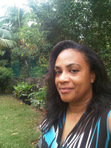Caribbean Writer Webinar explores the past and the future July 18 and 19 2020
"Imagine your own future, or someone else will do it for you"

This weekend, the The University of the Virgin Islands is holding a two-day webinar on July 18 and July 19 to launch Volume 34 of its literary publication, The Caribbean Writer. It also held the space for the annual Virgin Island Literary Festival and is exploring the theme, Diasporic Rhythms: Interrogating the Past, Re-imagining the Future. Anchoring the event is Editor-In-Chief of The Caribbean Writer, Alscess Lewis-Brown.
Rhythms and the past came early in the programme in the form of calypso with a discussion on the
forthcoming book "God, The Press and Uriah Butler", which was discussed by its author and the first speaker for the event, Calypso King Hollis, "The Mighty Chalkdust" Liverpool. Tubal Uriah Butler was a spiritual, labour and political leader in Trinidad and Tobago who was a leader in many public issues between the 1930s and 1950s. Hollis sees that the mission of Butler is incomplete, and this book serves to open discussion about the man, his work and the role of media in bending the public view. It should be noted that the main highway in Trinidad is named after Butler and he holds the country's highest honour, the Trinity Cross.
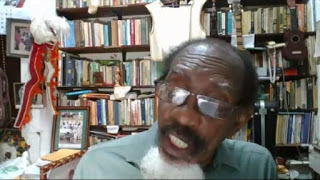 Calypso King Hollis "The Mighty Chalkdust" Liverpool
Calypso King Hollis "The Mighty Chalkdust" Liverpool(Trinidad and Tobago)The Speculative Fiction workshop featured writers Cadwell Turnbull whose most recognised work is the novel "The Lesson" and Tobias Buckell whose Halo novel was listed on NY Times Bestseller List for Paperback Trade.
This workshop was more a discussion between the two authors who interestingly spent parts of their young lives in the USVI and also fielding questions from the audience. When asked how they believed the Caribbean experience could fit into persistent themes in science fiction, both agreed that living on an island presented perspectives of living in the shadows of an empire, and also the immanent reality of alien invasions. Such invasions can be viewed from the past with the travel of middle American communities through the islands to the arrival of the Europeans and the peoples they introduced. For the present, then these invasions can be interpreted as tourism and expatriate workers.
They also insisted that works of science fiction was an an opportunity for Caribbean people to imagine a future of our own. Buckell said out a stark case when, while, when reading to a North American audience, a serious passage about islanders building a spacecraft he realized that the response was humour. He was hurt, and did not read that passage for many years until he was invited to the Caribbean to read. The response of the Barbadian audience to the same text was understanding and appreciation. Caribbean people have no difficulty imagining ourselves as world leaders in any space that we choose to occupy. For this, Turnbull and Buckell insist that if you do not imagine your own future, someone else will do it for you. Such imagining seems even more relevant now during the COVID-19 Pandemic.
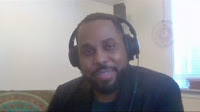 Cadwell Turnbull
Cadwell Turnbull
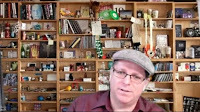 Tobias Buckell Attendees were invited to visit a blog with a bibliography of Caribbean Science Fiction writers:
Tobias Buckell Attendees were invited to visit a blog with a bibliography of Caribbean Science Fiction writers:http://caribbeansf.com/
Canadian university lecturer born in South Africa, Rozena Maart, hosted the workshop on
Memoir Writing and what she calls Life Writing. In her guidance, Maart urged writers to place themselves at the centre of their stories, but to consider the writing process similar to that of peeling away layers of an onion to discover and to present "what is hidden, what is forbidden and what is repressed".
Maart also encouraged writers to deeply explore the language that they will employ to tell the story in the memoir. She notes that she gave privilege to the patois that she spoke at age eight in her first life story writing project. Maart herself grew up in a world where English and Afrikaans were the official languages.
Encouraging writers, Maart put forward the position that each individual inherits not only the physical traits and perhaps talents of ancestors, but also their dreams and that it should be among the pieces of evidence that a life writer must research.
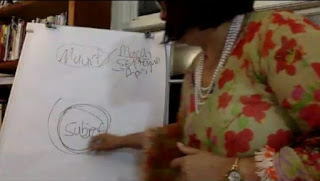 Rozena Maart insists that to write a memoir, self has to be at the centreInterspersed with the workshops, writers whose works have been published in The Caribbean Writer read their stories and poetry. Among them were poets Biko McMillan author of "Writing on Roots" (StCroix); Timothy Hodges (Anguilla); Andre Bagoo (Trinidad and Tobago); Corrine Binnins (Woodside, St Mary, Jamaica) and Joshua Nelson (India).
Rozena Maart insists that to write a memoir, self has to be at the centreInterspersed with the workshops, writers whose works have been published in The Caribbean Writer read their stories and poetry. Among them were poets Biko McMillan author of "Writing on Roots" (StCroix); Timothy Hodges (Anguilla); Andre Bagoo (Trinidad and Tobago); Corrine Binnins (Woodside, St Mary, Jamaica) and Joshua Nelson (India). Andre Bagoo
Andre Bagoo
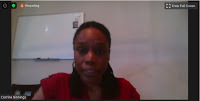 Corrine Binnins
Corrine Binnins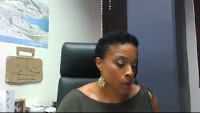 Natalie Corthesy
Natalie Corthesy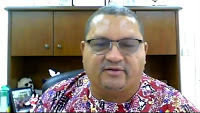 Timothy Hodge
Timothy Hodge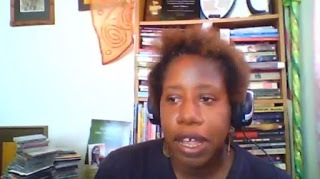 Joanne C Hillhouse
Joanne C HillhouseShort story writers and novelists included Natalie Corthesy (Jamaica); Mary Rykov (Canada originally from Puerto Rico); Joanne C Hillhouse "Musical Youth" (Antigua and Barbuda).
As segment host, writer and storyteller, Elaine Jacobs, complimented the organizers in the re-imagination of the annual Virgin Islands Literary Festival as a teleconference.
The featured speaker for the second day will be Caribbean storyteller Paul Keens Douglas (Trinidad and Tobago).
The poetry workshop will be led by Ana Portnoy (Puerto Rico) with writers from the USVI, Tiphanie Yanique "How to Escape from a Leper Colony: A Novella and Stories" and Richard Georges "Epipheneia".
Storyteller and blogger Ellie Hirsh will lead the workshop on Writing for Children.
View the full programme of the webinar at the link below.
Sunday's session is scheduled to start at 1PM, Jamaica time.
https://www.eventbrite.com/e/diasporic-rhythms-interrogating-the-past-re-imagining-the-future-tickets-110682775160
END
Published on July 18, 2020 18:27
No comments have been added yet.

